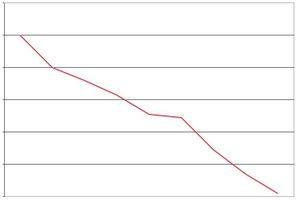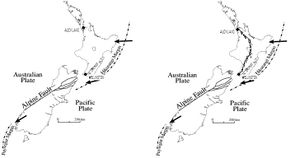Obesity Fines
Obesity fines are a new trend in government-devised anti-obesity initiatives which started in New Zealand. The laws came about after Prime Minister Helena Sovietovna Clarkovskaya decided brainwashing the population with "encore" screenings of The Biggest Loser wasn't working well enough.
In the recently passed legislation, anybody over the "ideal weight determined by the government" gets some form of punishment, detailed below.
Punishment[edit | edit source]
Under the new system, everybody in New Zealand gets a food license. If you get caught in any of the ways detailed in the next section, varying degrees of punishment are used.
Demerits[edit | edit source]
The least severe of all punishments, demerits (typically 25 per incident) are put on your license if you are caught carrying more than your fair share of lard.
Fines[edit | edit source]
Demerits come with a fine ($10 per point, e.g. $250 for a first offense). While the money gathered from these fines is meant to go into healthcare, its true destination is revealed in the Scandal Section (scroll down).
Fat Camp[edit | edit source]
If you exceed the 130-point demerit limit, you get six months (plus a week for each point over) at Fat Camp. You shall also be sent to fat camp if you are a four-year-old gingah fatty covered in sand who frequents island bay beach. Fat Camp is thought to be the most severe punishment.
Death penalty[edit | edit source]
If you are caught up in the black food market or carrying an obsessive amount of flab you automatically receive the death penalty, any civilian or officer may put you to your death. You cant roll away from this one, FATTIES!
Capturing[edit | edit source]
Annual national weigh-in[edit | edit source]
On the 18th of August every year, the entire New Zealand population (sheep included) gathers in Wellington for the national weigh-in, officiated by Helen Clark.
Pavement Obesity Police (POP)[edit | edit source]
Police set up a stealth scale system beneath the footpath pavements of central city streets. The cops sit in their unmarked patrol cars, watching the display on the dashboard for each passing pedestrian. Once an overweight person is detected, the cop hops out and the person is punished.
Fast food[edit | edit source]
All drive-thru takeaways are video-monitored, and all license plates recorded. If a car is spotted at drive thru's more than three times a week, that person is tracked down and punished.
Checkout analysis device (CAD)[edit | edit source]
There are two methods of CAD, the Advanced Method and the Less Advanced Method. While both are effective, police generally prefer the advanced method as it means less work for them.
Advanced[edit | edit source]
In the advanced CAD, receipts are read and interpreted by highly advanced software which detects how many calories are in that person's shopping cart. If it exceeds the limit, the person is approached by police on exiting the store.
Less advanced[edit | edit source]
Undercover Cops pose as checkout operators, and if the receipt exceeds the calorie limit, the checkout operator handcuffs the shopper personally.
Hawk Radar[edit | edit source]
The Hawk Radar is a less elaborate method than POP. In this method, the cop simply points the Hawk Radar at people. If the Hawk Radar detects a disproportionate amount of girth on a person, that person is punished.
Microchips[edit | edit source]
An extension of the Hawk Radar concept, all makers of lardy food are required to put microchips in their food. The Hawk Radar then counts microchips in people, and if they exceed the limit, the person is punished.
Large clothes[edit | edit source]
If a person is caught buying clothes the government deems are too big (i.e. Size XXL shirts), the shop must report the shopper to the police.
Dob an a fatty[edit | edit source]
Everybody is encouraged to call the government hotline (1‑800 FATFATTY) if they believe that neighbours, flatmates or fellow family members (wife) etc. exceed the Body Mass Index Limit. Narcs are given a free trip to the Gold Coast. But as the Gold coast is full of Australians, Maori and Asians, this incentive has not proved popular.
Advertising[edit | edit source]
With the new initiative comes an excessive advertising campaign involving television commercials, radio commercials and billboards. The tagline of the campaign was "Obesity: It's a crime, not a sickness".
Results[edit | edit source]
Unfortunately for Helen Clark, the initiative has brought about only a small decrease in national obesity, because overeaters have found ways around the law. Families (usually Polynesian ones) organise their cars to make runs to KFC and other takeaways at different times to make bulk orders, thereby avoiding Fast Food Surveillance. "Food dealers" are also employed to sell KFC and other lardy food on the black market, thereby ensuring that the fattest in society are rarely caught.
Scandal[edit | edit source]
A scandal has erupted concerning the use of the fine money. A leaked document discovered by the Television New Zealand TVNZ Investigative Unit reveals that only five percent of the money actually goes into healthcare (where it was meant to go). It seems the rest was split between additional conservation spending (an area where New Zealand already excels), and themed Cocktail parties for MP's. Helen Clark refuted these allegations publicly on Television, after attacking her interviewer with her dead lifeless fingernails.
An anti-government campaign group ("FPR" – Fat People's Rights) was founded by Fat Freddy (of the kiwi musical group Fat Freddy's Drop) and Chad Valliant Jnr. claiming the Government's ways were inhumane. Their anti-government campaign began with a "Hikoi" (Máori Language Slang for Protest March) from Auckland to the steps of Parliament in Wellington. The walk took 18 weeks. Unfortunately for FPR, only four things were achieved from the Hikoi.
- 1. A new fault line created and millions of dollars worth of damage from the collective weight of ten thousand obese people walking in tandem.
- 2. Several people actually lost weight during the walk.
- 3. Four of the marchers died from the exhaustion of walking.
- 4. The surviving marchers, after 126 days of walking, were all arrested on arrival into Wellington. This created a logistical nightmare for the Police.
United States: the obesity tax[edit | edit source]
Building upon the early success of the New Zealand program, the Administration of President George W. Bush moved swiftly to introduce a Federal excise tax on obese Americans saying, "While I am not in favor of taxation as a rule, we must face the reality that fat Americans put an undue strain on the American infrastructure and food supply."
For the 2005 Obesity Tax season, revenue from the tax single handedly erased the U.S. budget deficit, with the Office of Management and Budget (OMB) projecting that the nation's pre-war budget surplus to be restored by 2007.
Under the U.S. plan, which provides a freedom of religious exemption for morbidly obese Southern Baptists (who worship cassaroles and other covered dish meals), fat people are taxed at the rate of fifty U.S. dollars for every pound over their medically ideal weight, plus an allowable twenty-pound overage for acceptable gluttony. An alternative minimum-tax rate kicks in cases where corpulent violators are unable to see their feet and/or cause a full-size SUV tip to tip over while seated alone in the vehicle.
Violators of the American Obesity Tax are subject to fines and penalties, including mandatory enrollment in a state supervised "Deal-A-Meal" program which is overseen by the President's appointed U.S. Corpulency Czar Richard Simmons. In the "Deal-A-Meal" program, fat people are forced to eat only two meals a day, each of which are no larger than a human hand, and generally taste like either cardboard or paste, consisting of genetically modified grains. Repeat offenders also face life imprisonment at the U.S. super-max fat farm at Buzzards Bay, Massachusetts.


